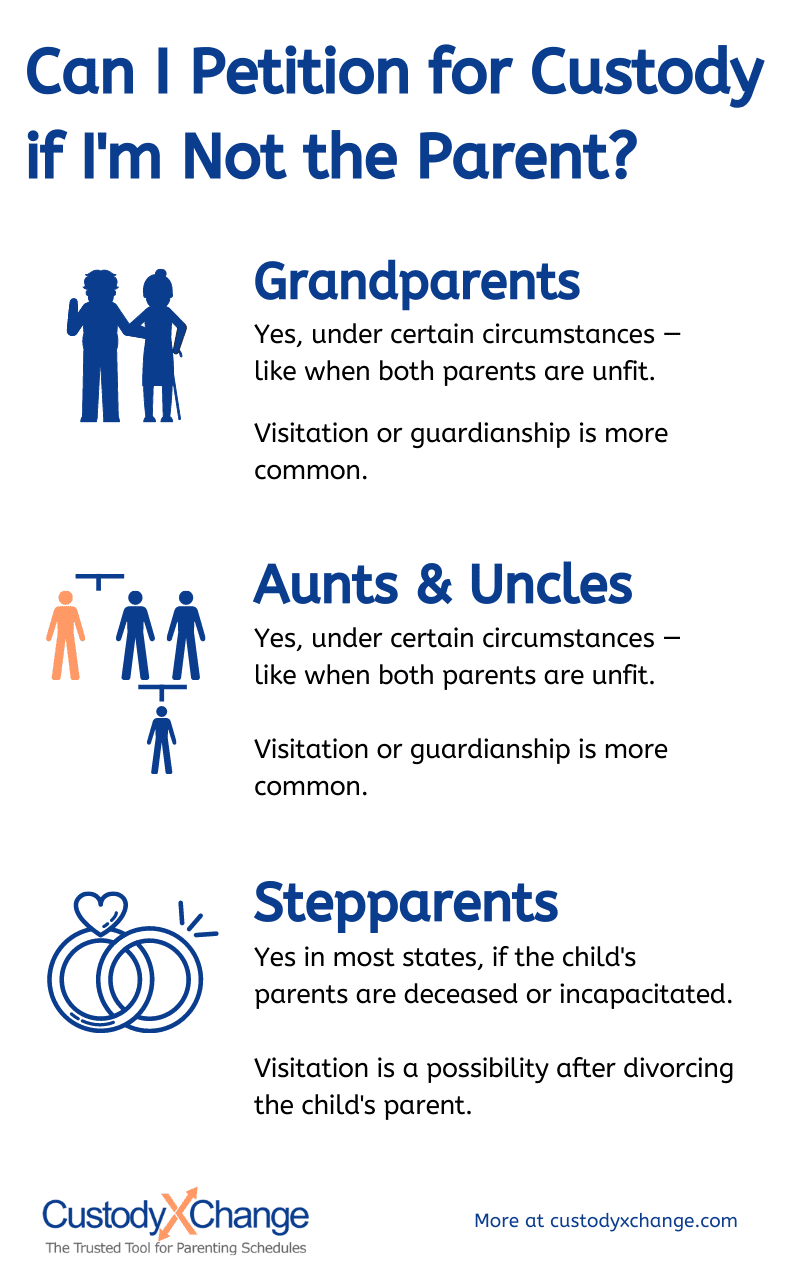Can Grandparents Get Custody Over Mother? Know Your Rights
Yes, grandparents can gain custody over a mother under specific circumstances, typically involving the child’s best interest. Courts often consider situations like neglect, abuse, or incapacity of the mother.
Custody battles can be complex, especially when grandparents seek custody. Many factors influence these decisions, including the child’s welfare and the parents’ capability to provide a safe environment. Legal standards vary by state, making it crucial to understand local laws.
Grandparents often play a vital role in a child’s life and may step in when parents face challenges. Courts prioritize the child’s emotional and physical well-being, often favoring relatives who can offer stability and care. Seeking legal advice can help grandparents navigate this intricate process effectively.
Legal Grounds For Grandparent Custody Claims
Grandparents can seek custody under certain legal grounds. These grounds vary by state. Understanding these laws is crucial for grandparents. They must demonstrate that custody is in the child’s best interest.
State-specific Custody Laws
Custody laws differ across states. Each state has unique regulations for grandparents. Here’s a summary of some common laws:
| State | Custody Criteria |
|---|---|
| California | Must show significant relationship with the child. |
| Texas | Grandparents can intervene if parents are unfit. |
| Florida | Must prove a substantial relationship exists. |
| New York | Can apply if parents are absent or unfit. |
Grandparents should research their state’s laws. Some states require proof of harm or neglect. Others allow custody if parents cannot care for the child.
Best Interest Of The Child Standard
The “best interest of the child” standard guides custody decisions. Courts prioritize the child’s welfare. Factors include:
- Emotional ties to grandparents
- Child’s age and health
- Stability of the home environment
- Parents’ ability to provide care
- Child’s preference, if age-appropriate
Grandparents must show how custody benefits the child. They need to provide evidence of a loving environment. Courts favor stable and nurturing surroundings.

Credit: www.cmlaw1.com
Challenging Parental Custody
Grandparents can seek custody if a parent is unfit. This process involves legal steps and evidence. Courts prioritize the child’s best interests. Understanding the criteria for unfitness helps grandparents prepare.
Instances Of Parental Unfitness
Parental unfitness can arise from several situations. Here are some common instances:
- Substance abuse: Drug or alcohol addiction affects parenting.
- Neglect: Failing to provide basic needs like food and shelter.
- Abuse: Physical or emotional harm to the child.
- Mental health issues: Untreated conditions that impair parenting abilities.
- Incarceration: A parent in prison may be unable to care for a child.
Evidence Required For Custody Cases
Gathering solid evidence is crucial for custody cases. Here are key types of evidence:
| Type of Evidence | Description |
|---|---|
| Witness Testimony | Statements from friends or family about the parent’s behavior. |
| Documentation | Records showing neglect or abuse, like medical reports. |
| Photos or Videos | Visual evidence of unsafe living conditions. |
| Police Reports | Records of incidents involving the parent. |
Gathering this evidence strengthens the case for custody. Legal advice can help navigate the process. Each case is unique, so understanding
Types Of Custody Options For Grandparents
Grandparents can seek custody of their grandchildren in specific situations. Understanding the types of custody options is crucial. Each option serves different needs and circumstances.
Full Custody Arrangements
Full custody means grandparents have complete legal rights over the child. This option provides stability and security for the child. Grandparents make all important decisions regarding:
- Education
- Healthcare
- Religious upbringing
To obtain full custody, grandparents typically must:
- Prove the parents are unfit.
- Show that living with grandparents is in the child’s best interest.
Full custody can be permanent or changeable based on circumstances.
Temporary Or Emergency Custody
Temporary custody is a short-term solution. It often occurs in urgent situations. Grandparents can step in when:
- The parents are unable to care for the child.
- There are concerns about abuse or neglect.
This arrangement allows for immediate care while assessing the situation. Grandparents must often file for temporary custody in court. The court will review the case quickly to ensure the child’s safety.
| Custody Type | Duration | Legal Rights |
|---|---|---|
| Full Custody | Permanent | All parental rights |
| Temporary Custody | Short-term | Limited parental rights |
Temporary custody can later lead to full custody. Courts prioritize the child’s safety and well-being.

Credit: www.custodyxchange.com
Navigating The Legal Process
Grandparents seeking custody over a mother face a complex legal journey. Understanding the steps involved is crucial. This section will guide you through the process, ensuring you’re well-prepared for each stage.
Steps To Initiate A Custody Case
- Understand Your Rights: Familiarize yourself with local laws on custody.
- Gather Documentation: Collect evidence supporting your case. This may include:
- Medical records
- School reports
- Witness statements
- File a Petition: Submit your custody petition to the court.
- Attend Mediation: Courts often require mediation before a hearing.
- Prepare for Court: Organize your documents and evidence for the hearing.
Seeking Legal Representation
Having a qualified lawyer can significantly impact your case. Here are some tips to find the right legal representation:
- Research Experienced Attorneys: Look for lawyers who specialize in family law.
- Check Reviews: Read client testimonials to gauge their effectiveness.
- Schedule Consultations: Meet potential lawyers to discuss your situation.
- Discuss Fees: Understand the cost structure before hiring.
Your lawyer will help you navigate the complexities of custody laws. They will guide you through paperwork and court proceedings. Legal representation ensures your interests are well-protected.

Credit: www.facebook.com
Frequently Asked Questions
Can Grandparents Gain Custody From A Mother?
Yes, grandparents can seek custody if they prove it’s in the child’s best interest and the mother is unfit.
What Factors Influence Grandparent Custody Rights?
Factors include the child’s well-being, parent’s ability to care, and the existing family dynamics.
How Can Grandparents Apply For Custody?
Grandparents must file a petition in family court, detailing their relationship with the child and concerns about the mother.
What Are The Legal Grounds For Grandparent Custody?
Legal grounds include neglect, abuse, or instability in the mother’s environment affecting the child’s safety and welfare.
Can Grandparents Get Visitation Rights Instead Of Custody?
Yes, grandparents can seek visitation rights if custody is not granted, ensuring they maintain a relationship with the child.
Conclusion
Grandparents can indeed seek custody under certain circumstances. Their ability to provide a stable environment may benefit the child. Legal requirements vary by state, making it essential to understand local laws. Consulting a family law attorney can help clarify options.
Ultimately, the child’s best interests remain the top priority in custody decisions.
